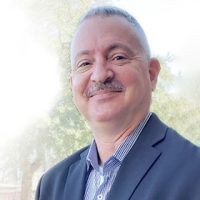Expert Panel:

Dr. William Wierda, President & CEO, CLL Global Research Foundation

Jeff Folloder, Moderator and CLL patient advocate
Our recent CLL Global Research Foundation Town Hall featured CLL Global President, Dr. William Wierda, and Dr. Constantine Tam from Monash University in Melbourne. CLL patient advocate Jeff Folloder moderated the event. Watch the full webinar.
Transcript
Jeff Folloder:
I have a question for Dr. Wierda. And it’s going to sound innocent, but I suspect that the answer is a little bit more complicated than we think. This is a question that I had when I first started my CLL experience. How do you know when common symptoms are CLL-related or something else? I’m talking about random coughs, itching, fatigue, bleeding. How do you know it’s Cll-related, or it’s nothing to worry about?
Dr. William Wierda:
That’s a great question. And it’s something that I talk a lot about in my clinic with patients, because it’s oftentimes not clear. And it’s oftentimes not clear particularly for the troubling symptoms of things like fatigue, and occasionally night sweats. Things like that, that are reasons that we would start treatment for patients if we think that they’re from their CLL, and causing significant impact on their quality of life. So, it’s not an unreasonable question, and something that we talk about a lot in the clinic.
I think probably a couple principles that I would encourage patients to keep in mind. And with CLL symptoms, particularly, they don’t usually happen overnight. They are usually things that start out – they’re not very frequent. So, for example, fatigue or night sweats. And they sort of escalate. But they don’t escalate in a rapid fashion. They usually escalate gradually, over weeks, months, even sometimes years. So, if there’s something that happens that’s abrupt, and unexpected, and – then it’s probably not the CLL. And those are situations where I aggressively look for other explanations and other causes.
Sometimes we’re at a point where patients have had fatigue for months, and they say well – and they don’t have a high white count. They don’t have enlarged lymph nodes. So, from my perspective, it’s a little bit confusing, because they have these significant symptoms, but they don’t have a lot of measurable disease. Usually, the symptoms correlate with the amount of disease that’s present. The larger the lymph nodes, the higher the white count, the more likely patients will have some symptoms.
But occasionally we’ll see patients, they don’t have a lot of lymph nodes enlarged, they don’t have a high white count, they’ve got significant fatigue. And sometimes you get into a situation where you – I have a discussion and say, “Okay, well, I’m not sure 100 percent. All treatments have risks. If these symptoms are bothering you enough, we can do a trial of treatment to see if your symptoms improve with the treatment. If they don’t improve with the treatment, then they’re not coming from the CLL. If they do, then great, we’re on the right track. And we can proceed with continuing the treatment.” But it can be a challenging situation and can be challenging.
The other thing I would say is that enlarged lymph nodes or rapidly enlarged lymph nodes, if there’s pain and tenderness, it’s not usually from the CLL. CLL doesn’t usually cause tender painful nodes. That’s usually something related to an infection.

